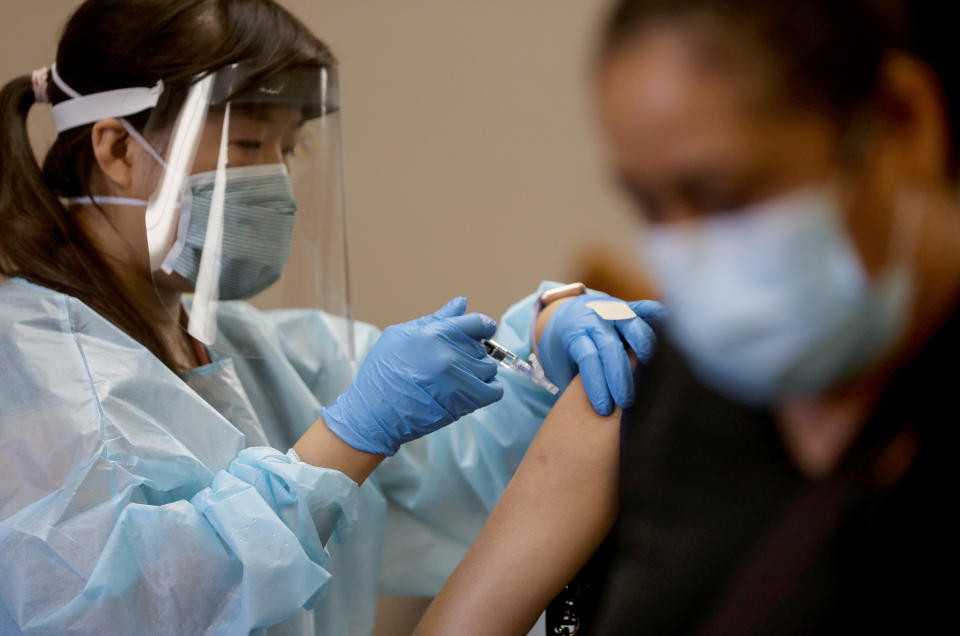Flu shot vs. nasal spray: Which vaccine is better this year?
The messaging couldn’t be more clear: Everyone who is over the age of 6 months and able should get the flu vaccine this year. But while the Centers for Disease Control and Prevention and other public health officials have stressed the importance of getting vaccinated against the flu this fall, there hasn’t been a lot of discussion about which kind to get.
There are several types of flu vaccines, but they can generally be grouped into two categories: the shot and the nasal spray. Each is slightly different, and it’s understandable to have questions about which is right for you. Here’s what you need to know.

What is the difference between the flu shot and the nasal spray vaccine?
There are actually several. At a very basic level, the flu shot is given with a needle in your arm while the nasal spray vaccine is misted into your nose. But the differences don’t end there.
The flu shot uses an inactivated (dead) version of the flu to stimulate your immune system, while the nasal spray vaccine uses an attenuated (i.e. weakened) live virus, the CDC explains. While both vaccines may cause flu-like side effects, neither vaccine can actually give you the flu, Dr. William Schaffner, an infectious disease specialist and professor at the Vanderbilt University School of Medicine, tells Yahoo Life.
There are different forms of the flu shot, but many people under the age of 65 will receive the quadrivalent flu shot. That’s designed to protect against the following strains, per the CDC:
A/Guangdong-Maonan/SWL1536/2019
A/Hong Kong/2671/2019
B/Washington/02/2019
B/Phuket/3073/2013-like virus.
The nasal spray vaccine is also a quadrivalent vaccine and protects against the same strains, the CDC says.
So, which vaccine should you choose?
It depends. Historically, the nasal spray vaccine wasn’t as effective as the flu shot, Schaffner says. “There was some question in the past about the effectiveness of one of the components of the influenza nasal spray vaccine,” he says. “For a couple of years, it wasn’t recommended.” However, the nasal spray vaccine was reintroduced in 2018.
Now, the CDC says that people should choose the vaccine that is appropriate for their age and health status “with no preference expressed for any one vaccine over another.”
According to the CDC, the nasal spray vaccine can be used in people between the ages of 2 and 49 who are not allergic to eggs. People without a spleen, pregnant women, those who are immunocompromised and children with asthma should not use the nasal spray vaccine, the CDC says.
But if you meet the criteria for the nasal spray vaccine and are interested in trying it, “it’s an option to use,” Dr. Amesh A. Adalja, senior scholar at the Johns Hopkins Center for Health Security, tells Yahoo Life. “There’s no preference anymore,” he says. “It is something you can think about getting.”
Ultimately, it may come down to availability. Given the nasal spray vaccine’s history, not every medical provider is big on using it. “Some practitioners are rather wary to see whether it’s as effective as the injectable at the present time,” Schaffner says. “Its role is still a little bit fuzzy.”
But if you’re nervous about getting a shot and can find the nasal spray vaccine, it’s something to consider.
For the latest coronavirus news and updates, follow along at https://news.yahoo.com/coronavirus. According to experts, people over 60 and those who are immunocompromised continue to be the most at risk. If you have questions, please reference the CDC’s and WHO’s resource guides.
How to maintain your physical and mental health during the pandemic
Taking care of a loved one with COVID-19? Here’s how to stay healthy
Q&A with Dr. Kavita Patel: How to keep your family safe and maintain your mental health
Read more from Yahoo Life
CDC: Black, Latino people make up nearly 43 percent of COVID-19 deaths
COVID-19 vaccines may not be recommended for children initially, says the CDC
Want lifestyle and wellness news delivered to your inbox? Sign up here for Yahoo Life’s newsletter.



